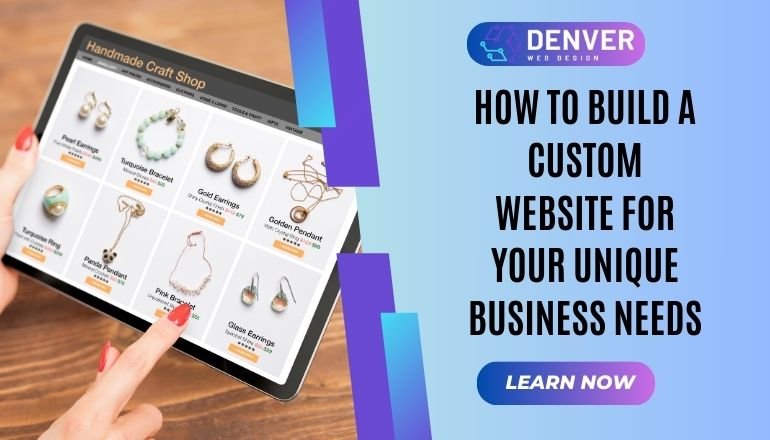
Building a custom website is essential for businesses that want to stand out in today’s competitive digital landscape. Whether you’re launching a new business or upgrading an existing one, a custom-designed website allows you to tailor every aspect to meet your unique needs. This article explores the process of creating a custom website and highlights the best practices to follow, including responsive design, user experience (UX), and SEO optimization.
At Web Design Denver, we specialize in creating custom websites that align with the specific goals and identity of your business. Keep reading to learn how to build a website that works for you and engages your target audience.
What is a Custom Website?
A custom website is designed specifically to meet the unique requirements of your business. Unlike template-based websites, a custom site is built from the ground up, allowing for tailored functionality, design, and user experience. The concept behind custom web design is to create a solution that aligns perfectly with your brand, offers functionality specific to your industry, and delivers an optimized experience for your users.
Building a custom website offers flexibility, scalability, and the ability to integrate any specific features or applications your business may require. Whether you need an e-commerce platform, booking system, or content management system (CMS), a custom-built website can accommodate these needs without restrictions.
Why is a Custom Website Essential for Your Business?
A custom website is not just about aesthetics; it’s an essential tool for business growth, SEO, and customer retention. Here’s why investing in a custom design is crucial:
- Tailored to Your Business Needs: A custom-built website can reflect your unique value proposition, target audience, and business goals. Whether you are an e-commerce store looking to optimize conversion rates or a service provider aiming to streamline client bookings, a custom site offers the flexibility to include the necessary features for success.
- SEO-Optimized Websites: One of the biggest benefits of custom web design is the ability to create an SEO-optimized website from the start. By incorporating best SEO practices like clean coding, optimized page structure, and keyword integration, a custom-built site helps increase your website’s search engine visibility, improving your Google ranking and driving more organic traffic.
- Enhanced User Experience (UX): Custom websites allow you to design with the user in mind. You can create intuitive navigation, ensure a mobile-first approach, and improve page load times all factors that contribute to a better user experience. This enhances customer satisfaction, reduces bounce rates, and increases engagement and conversion.
- Scalability and Flexibility: As your business grows, your website should grow with it. A custom site is highly scalable, which means it can easily accommodate future changes, whether that’s adding new pages, expanding product lines, or integrating advanced functionality.
Key Features of a Custom Website
When building a custom website, certain key features ensure its success:
- Responsive Web Design: In today’s digital landscape, your website must work seamlessly across all devices, including desktops, tablets, and smartphones. Responsive web design adapts to various screen sizes, providing a consistent and user-friendly experience regardless of device.
- SEO Best Practices: Incorporating SEO from the start is critical for visibility and attracting traffic. This includes on-page SEO elements such as meta tags, alt text, proper URL structure, and keyword-rich content, ensuring your website ranks well on search engines.
- User-Friendly Navigation: Your custom website should offer easy-to-use navigation with clear calls-to-action (CTAs). This enables visitors to quickly find what they are looking for, improving user experience and increasing conversion rates.
- Custom Functionality: Whether you need a content management system (CMS), secure payment gateways for e-commerce, or an integrated booking system, a custom website allows for tailored functionality that meets your business needs.
- Mobile-First Design: Given the rise in mobile traffic, mobile-first design is no longer optional. With a mobile-first approach, your website is designed with mobile users in mind first, ensuring it’s fully optimized for smaller screens and faster load times.
Best Practices for Building a Custom Website
To create a website that stands out and performs well, consider the following best practices:
- Focus on User Experience (UX): Prioritize usability by making your website intuitive and easy to navigate. Implement UX design principles, such as user-centric design, easy-to-find content, and a clear hierarchy of information.
- Page Load Speed: A slow website can turn potential customers away. Optimize images, use efficient coding practices, and take advantage of content delivery networks (CDNs) to improve page load speed and keep visitors engaged.
- Security: Custom websites need to be secure, especially if you’re handling customer data. Implement an SSL certificate, ensure strong password protection, and keep your website’s software up to date to avoid security vulnerabilities.
- Incorporate Analytics: Utilize tools like Google Analytics to track user behavior and gather insights into how your visitors interact with your site. This data can help you improve functionality, content, and design over time.
- Conversion Rate Optimization (CRO): Design your website with conversion in mind. This could mean strategically placing CTAs, offering special promotions, or simplifying the checkout process for e-commerce websites to improve conversion rate optimization (CRO).
Common Mistakes to Avoid
When building a custom website, avoid these common mistakes:
- Overcomplicating the Design: While it’s tempting to incorporate flashy elements, simplicity often leads to a better user experience. Avoid unnecessary complexity and focus on creating a clean, functional design that drives results.
- Neglecting Mobile Optimization: In today’s mobile-driven world, neglecting mobile optimization is a major mistake. Ensure your website is fully optimized for all devices, as Google prioritizes mobile-friendly sites.
- Skipping SEO: Many businesses make the mistake of thinking SEO is an afterthought. It should be integrated into the website design from the beginning to ensure it ranks well on search engines.
- Ignoring Website Maintenance: After launching your custom website, ongoing maintenance is crucial. This includes regularly updating content, fixing bugs, and ensuring that all features are functioning properly.
Conclusion: Key Takeaways
Building a custom website tailored to your business needs can elevate your brand, improve user experience, and boost conversions. By following best practices like focusing on responsive web design, integrating SEO for websites, and prioritizing user experience, you can create a website that stands out from the competition.
If you’re ready to create a website that works for you, Web Design Denver is here to help. We specialize in custom web design and professional web development services to meet the unique needs of businesses like yours. Contact us today to get started on building a website that drives results.






